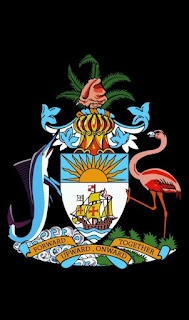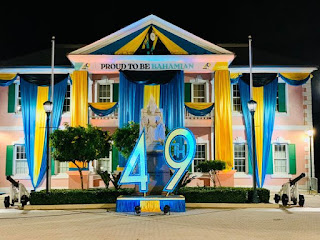Bahamian Independence: Where is the Strategical Empowerment of the Average Bahamian?
BAHAMIANS - TO BE INDEPENDENT OR NOT INDEPENDENT, THAT IS THE QUESTION?
By Dr Kevin Joseph Turnquest Alcena
LLB (Hon-1st Cl.), LLM (Hon-1st cl.) Ph.D. in Economics/Ph.D. in Clinical Psychology/Ph.D. in Public Health/Ph.D. in Herbal and Holistic Medicine/Ph.D. in Biogenetics/M.D. Titular Professor, Lawyer July 9 9 2022
As we here in The Bahamas stand on the precipice of celebrating forty-nine (49) years as an “independent” nation, I ponder on the idea of whether we have indeed attained real freedom. What then does it mean to be independent? What have we really achieved in pursuit of liberty? What have we gained in our ambitious attempt to climb the ladder to sovereignty?
Well, according to Maria Montessori, “Independence is not a static condition; it is a continuous conquest, and in order to reach not only freedom, but also strength, and the perfecting on one’s powers, it is necessary to follow this path of unremitting toil.”
Have we understood the conditions necessary to thrive as an independent nation? Or have we deceived ourselves into thinking that we have prospered in this capacity?
If we were to be honest with ourselves, have we carried out the mandate that was left behind by our forefathers to ensure that we are ‘one people united in love and service?’ Can we look through the dispensations of time and say that we have done all that we can as Bahamians to ensure that we are leaving this nation as an inheritance for our future generations?
Proverbs 13:22 says, “A good man leaveth an inheritance to his children’s children…”
Have we done justice to that which was left behind by those that went before us, or have we carelessly squandered the resources and ignored their pleas of guaranteeing the next generation is taken care of?
Let us review what has been done over the past forty-nine (49) years.
Firstly, can we call a ten-billion debt advancement? Over the years to free ourselves from the bars of being dependent on other countries we have accumulated an astounding amount of debt that has left us I daresay, more bound than ever!
We see no improvement in terms of debt management. We have regressed as we have made ourselves slaves in our own country to China, the United States, Europe, even our neighboring Caribbean countries.
John Adams said it best, “There are two ways to conquer and enslave a country. One is by the sword. The other is by debt.”
How can we say we are truly free when we depend on everyone to feed us, keep our economy running, keep our cars on the road, our environment secured, even our borders safe? How are we uninhibited when we do not see a need to break free from the chains of our self-created bondage?
We have become so complacent in being slaves that we fight to stay enshrouded in the safety net of captivity rather than war for true liberty. We have simply traded on task master for another.
We have trained each other, like the Pavlovian Model of Consumer Behavior to answer the call of the slave masters of our nation. This conditioning has matriculated down through the ages to the detriment of our children and their children’s children.
As a result, we have constructed a society of entitled, unmotivated and unproductive people who do not even comprehend the fact that they are in subjugation to a society that they will never be released from.
Most people are only living from pay cheque to pay cheque. Therefore, so many struggle to survive when it is time to retire because of the debt that has been accumulated over time. We have been conditioned by our leaders to borrow and borrow to the inconveniency of eternal servitude that our generational line must suffer through.
So instead of inheriting lands and wealth, we inherit debt upon debt. As Proverbs 22:7 declares, “The borrower is slave to the lender.” Can we in fact say that we have succeeded in our goal of being free?
Secondly, do you think it was the objective of our predecessors on their march to freedom to create a government that spends more time warring, rather than working with each other? “Party disputes are now carried to such a length, and truth is so enveloped in mist and false representation, that is extremely difficult to know through what channel to seek it out” (George Washington).
Successive governments - one after the other, continue the trend of the very thing our progenitors tried to escape that being partisanship in our political ideology.
How can an overcrowded Civil Service be called evolvement? The Bahamas is so far behind in terms of growth and development as opposed to our counterparts in the U.S., Canada, Africa, and the Caribbean. Why?
For one thing we cannot seem to grasp the concept of promotion based on training and skill rather than seniority.
Where then, is the strategical empowerment of the average Bahamian?
There is a consistent cry that the government has no money to hire. Yet we see the same people that have recently retired back in the public eye, paid thousands of dollars to ‘work’ on contract, while everyone beneath them carries out the labor. How can we say we are independent when even in the workplace, we do not believe in succession planning or giving others the chance to excel?
There is a persistent complaint by the powers that be, about the lack of trained young people, but when they become qualified, they are told there are no opportunities for them! But we wonder why when they go off to school, they have no desire to come back home.
The solution here is simple, let those that are retired, stay home and open doors for more opportunities for those that are qualified through incentivized programs so that they can come back home.
Moreover, when persons make the bold move to try and elevate themselves, they are met with all kinds of hinderances. The idea that they would have the audacity to step out of line and out of their place, reemphasizes the oppression we have been born into.
Galatians 5:13 states, “For brethren you have been called unto liberty: only use not liberty for an occasion to the flesh, but by love serve one another.” According to our constitution, we consider ourselves to be a Christian nation. If that be the case, why do we despise our own and not as the word says, serve one another?
Why do we instead continue to choose others over our own and exploit one other to please the slave masters we have inherited? Why do not help one another excel and elevate, rather than tear each other down? Why do we continue to keep the masses down and impoverished, rather than empowered? I ask you my brothers and sisters, is this what independence really means?
Ervin Welsh said, “It is important to know we can celebrate independence, but more so to ensure we are not living in-dependence.” How powerful is it when we comprehend the fact that to be free doesn’t automatically mean freedom has been gained?
When one looks at the fact, that we are set free on paper, yet we depend on everyone for survival. This has bled into our educational system that has for years been failing our children.
Why are still using the forms of standardized testing implemented by the British to test our children? Why do we still need to get accreditation from other countries before our children’s test results are placed on par with other countries so that they can go to school abroad?
After forty-nine years of independence why is the national average still a “D”? It’s a crying shame that this is where we are presently standing.
According to a survey done by the World Bank, the Caribbean countries has an 89% literacy rate which is surprisingly higher than the U.S.! Furthermore, The Bahamas ranks 7th in The Caribbean with a literacy rate of 95.6%. This tells me then than we as a people are just as capable of doing anything as any other country around the world.
If that is so, why are we still utilizing programs and systems from other countries to steer our educational system? Would not the people most suited to write programs for our schools, be other Bahamians that are well versed in Computer Technology?
This level of dependence will continue to stunt our students’ growth and progress. This was clearly seen, three weeks ago with the disastrous crashing of the LMS System utilized by the Ministry of Education that resulted in production of school report cards being delayed by two weeks!
Consequently, when report cards were picked up this past week, parents were not able to have their queries answered as teachers had already left for summer vacation. This is a prime example of why their needs to be an overhaul of the educational system and redesigned for optimal success of our children.
Finally, if we are to genuinely be independent, we must change the modus operandi of how we do business. We can no longer depend on Tourism to merely support us.
There must be a clear partisan, paradigm shift of our economy because income taxes are not going to do it!
While we were smart enough to rectify many of our impending problems, we must be strategic in our resolve moving forward collectively as a nation.
We need land reform. Sir Lynden Oscar Pindling institutionalized this country and I have not seen any other Prime Minister after him do so. Rather they have uplifted all their friends making them richer.
We have inherited over the last forty-nine years a tribal form of government, from both sides. The latest trend is maculating themselves in ego and positioning with the aim of personal gain first, as opposed to servanthood.
The wealth of this nation no longer trickles down, the status quo is ‘you get into politics, you take care of your friends.’
There is an Attaliah Spirt that has spread throughout the various ministries in this country, from education to government.
The continual assassination of those that try to bring change has always been overtaken by the misogyny imposed upon them and their voices hushed by the powers that be.
We must find another way to eliminate this Attaliah construct. As Nelson Mandela said, “For to be free is not merely to cast of one’s chains, but to live in a way that respects and enhances the freedom of others.”






